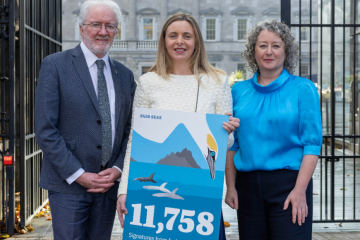Groundbreaking EPA report reveals scale of microplastic pollution in Irish freshwaters

June 8th, 2017
A groundbreaking Environmental Protection Agency (EPA) report published today reveals for the first time evidence on the sources and scale of microplastic pollution in Ireland’s freshwater system.
The research, led by the Marine and Freshwater Research Centre at Galway-Mayo Institute of Technology also highlights a number of potential impacts on human health.
Microplastics are tiny plastic granules, pellets, fibres and fragments less than 5mm in diameter and are often as thin as a human hair.
Potential health impacts included exposure through drinking water, accidental ingestion through bathing and consumption of food prepared using contaminated water.
People are also open to ingesting microplastics through the consumption of freshwater fish such as salmon or trout.
The study also identified over 20 different species of molluscs, fish, birds, mammals and crustaceans that are potentially at risk from microplastic pollution, many of which are endangered, such as the freshwater pearl mussel.
The Minister for Housing, Planning, Community and Local Government, Simon Coveney launched a public consultation earlier this year on a potential microbeads ban in certain products such as cosmetics, body care products and some cleaning products. Over 3,000 submissions were received.
Mr Coveney outlined his delight with the response, which he said will feed into upcoming legislation. “This clearly demonstrates that civil society is extremely concerned by marine environmental issues, which I find reassuring,” he said.
According to Dr Anne Marie Mahon, the report’s lead author, a ban on cosmetic microbeads would only solve a fraction of the microplastics problem.
She added that the best way to tackle and reduce microplastic pollution is to remove it at the source – such as plastics manufacturing, recycling industries and landfill – rather than trying to address it after pollution occurs.
One of the largest point sources of microplastics was identified in the report as urban wastewater treatment plants, receiving microplastics from a number of different sources.
“Although some microplastics are discharged with the wastewater into receiving freshwater systems, most of these fibres become trapped in sewage sludge at treatment plants,” Dr Mahon said.
As the microplastics break down into smaller particles, their surface-area-to-volume ratio increases, leading to a greater chance of being absorbed by organic materials in the sludge.
“Landspreading of these sludges on agricultural land poses risks to terrestrial ecosystems and potentially further risks to freshwater systems,” Dr Mahon warned.
Following the release of the report, The Green Party today called for the Government to get more “ambitious” in its steps to tackle the level of microplastics entering our marine ecosystems.
“This very timely report has shown our fears about the level of plastic pollution in our seas are well founded,” said Green Party Senator Grace O’Sullivan.
Ms O’Sullivan introduced a bill to ban microbeads and monitor microplastics in Irish water systems which was defeated by the Government and Fianna Fáil earlier this year.
“I will continue the fight with my Green Party colleagues to ensure the government takes strong action to tackle plastic waste, and to support a truly ‘circular economy’ at the European and global level,” said Ms O’Sullivan.
“We need to protect human health, as well as the health of our seas and oceans, which Ireland, in particular, relies on for so much.”
The report, entitled “Scope, Fate, Risks and Impacts of Microplastic Pollution in Irish Freshwater Systems” is now available on the EPA website http://www.epa.ie/pubs/reports/research/water/
The EPA is funding two additional research projects which will further investigate and provide the evidence of the impacts of microplastics in the freshwater environment in Ireland.
[x_author title=”About the Author”]







